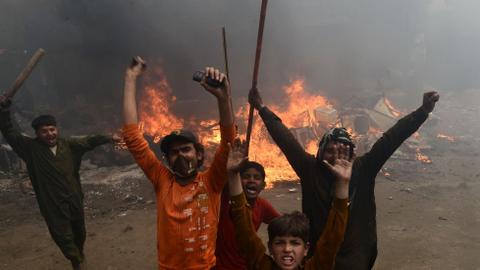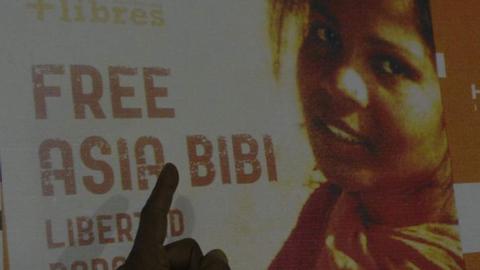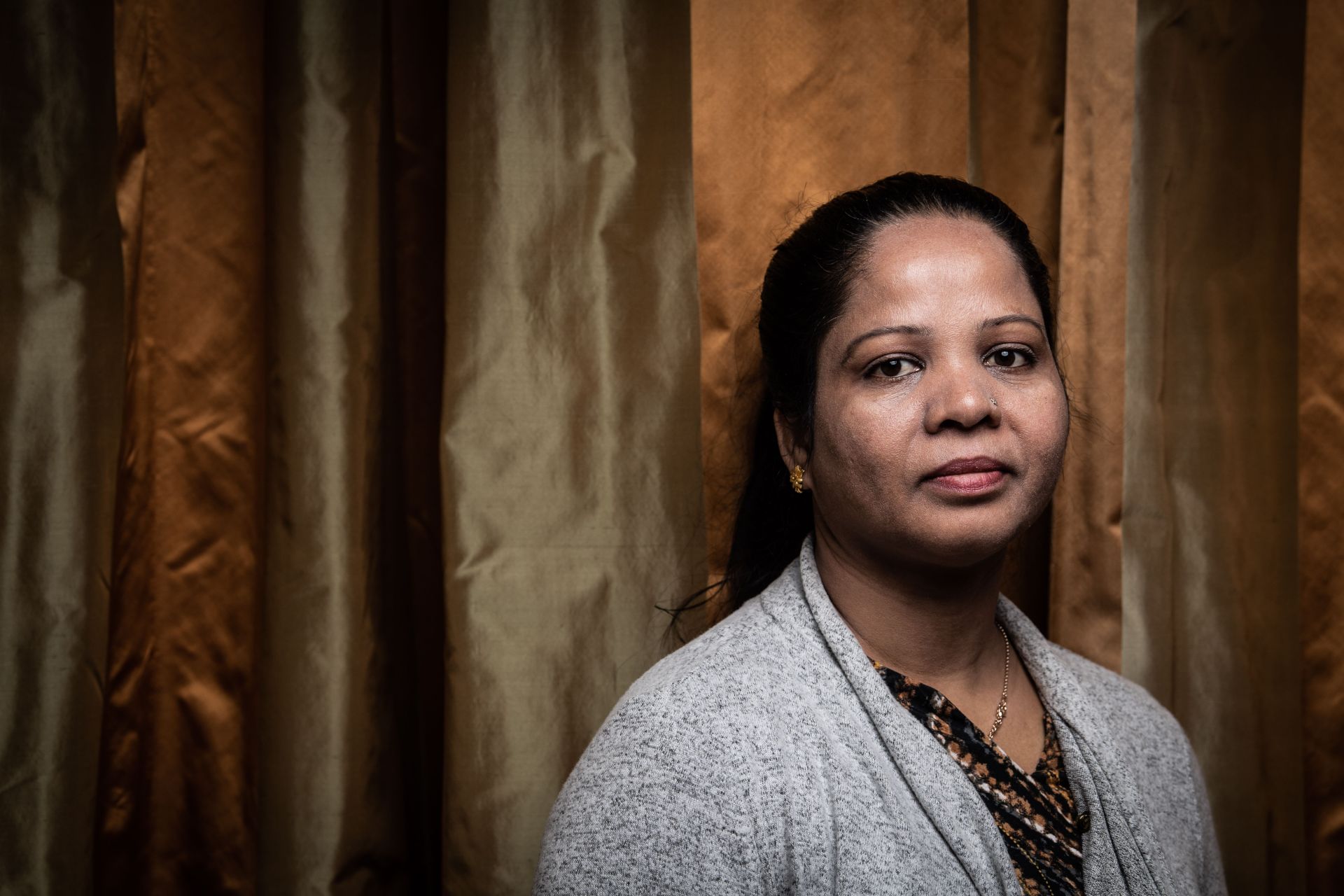ESSAY: THE POLITICS OF BLASPHEMY AND LYNCHING

On December 3, an angry mob lynched Priyantha Kumara, a Sri Lankan man working as a manager in a garment factory in Sialkot. Kumara’s corpse was set on fire on the road over allegations of blasphemy. People recorded the bone-chilling tragedy, uploading videos on social media.
The cold-blooded murder that brought “shame to the nation” has potentially revived the public debate on blasphemy in the country. In such discussions, generally, the Pakistani media and civil society focuses on two points: the rise of the Tehreek-i-Labbaik Pakistan (TLP) on the one hand, and the government’s inability to effectively contain its extremist ideology and to repeal the blasphemy laws on the other.
The problem with the recommendations is twofold. One, they ignore the historical roots of violence in the name of religion. Two, they also overlook how Islam relates to politics and modern ideas such as freedom of speech.
The popular — and somewhat ‘scholarly’ — reaction to these tragic incidents reveals that the state’s capacity to deal with such cases is often, if not always, overestimated. There is little a state can do in these matters when a major chunk of the society can potentially be out on the streets: take, for example, the backlash against the question of the sanctity of Prophet Muhammad (PBUH). No law can ever punish a whole community. Laws are made to correct severe deviations which potentially endanger the political order, not general behavioural patterns.
Rethinking Pakistan’s blasphemy laws necessitates a probe into the rise of religiously inspired violence in the Muslim world and into Islam’s unique relationship with politics
Laws cannot, and should not, be made to correct entire communities or their ideological orientation. In the instant case, the vast majority, tacitly or otherwise, believes that “blasphemers must be beheaded.” Those who accused Kumara of blasphemy might have some personal grudges, but the hundreds of Muslims on the roads were religiously motivated. They had no personal enmity against him, and this demands a serious discussion.
This piece is an invitation to think about blasphemy laws, and the rise of religiously inspired violence in the Muslim world, in a historical context, with a focus on Pakistan. I do not claim to offer any definite answers. However, what I intend to do is the correct diagnosis of our multifaceted challenges: that it is not just a state matter, rather the problem is much deeper in society and history.
Violence in the name of religion is dangerously rampant in Pakistan. Though the country has not executed a single convict under the controversial blasphemy laws, yet from 1990 to 2021, 70 people accused of blasphemy have been killed by mobs. Last month, a charged mob set fire to a police station in Khyber Pakhtunkhwa’s Charsadda district when officials declined to hand over an alleged blasphemer to the mob.
Previously, in a high profile case in 2017, a 23-year-old student, Mashal Khan, was lynched and tortured to death by his colleagues on the campus of Abdul Wali Khan University in Mardan, Khyber Pakhtunkhwa.
The blasphemy dynamic has been converted into a political movement, particularly in recent years. The killing of Salman Taseer, Governor of Punjab, by his security guard, Mumtaz Qadri, the decision to hang Qadri for his crime, which helped TLP founder Khadim Hussain Rizvi to launch his party, the release of Asia Bibi, a Christian woman falsely accused of blasphemy, by the Supreme Court of Pakistan, and the recent rise of anti-Islam sentiments in France following French President Emmanuel Macron’s declaration that “Islam is in crisis”, have all contributed to the emergence of the militarised politics of blasphemy in Pakistan.
In an article published on December 12 in Eos, Nadeem F. Paracha wrote an intriguing essay. After giving a detailed historical account of blasphemy laws in the subcontinent, starting with the first-ever documented ‘blasphemy law’ of 1860, Paracha maintains that certain changes were made to it in 1927, and then finally it was made more rigid in scope during the Islamist military dictatorship of General Ziaul Haq in the 1980s.
Historically, and doctrinally, the impression that the British colonial government and Gen Zia are responsible for the creation of blasphemy laws seems problematic. The movement for Pakistan had a largely religious expression, the Objectives Resolution made it more explicit and Pakistan’s parliament declaring Ahmadis non-Muslims in the tenure of PM Zulfikar Ali Bhutto are solid, empirical evidence that there has always been a deep and complex relationship between Islam and politics. British rule and Gen Zia played their due role in the historical development of present-day vigilantism, but they are definitely not the authors of this tragedy.

The issue’s complexity needs a historical and broader understanding of violence in the name of religion in the Muslim world. There have always been such cases throughout Muslim history. In the mid-14th century, Ibn al-Khatib, a scholar known as “the man who had two deaths”, disagreed with mainstream scholars who claimed the Black Death was not contagious in nature. He interpreted a Hadith to offer evidence that the illness was contagious. Unfortunately, the chief judge censored Al-Khatib and ordered the burning of all of his books. Later, he was arrested and tortured to death. Although he was buried the next day, an angry mob reopened his grave and set his corpse on fire.
Part of the problem either lies in history or the way religion was interpreted in the earlier centuries. Unsurprisingly, Sunni jurists from the Shafi and Maliki schools of thought held that the blasphemer should be punished if they do not immediately repent. The Hanbalis went a step further and held that blasphemers should be punished even if they repent. A few Hanafis argued that there was no categorical basis for the execution of blasphemers; they may only be jailed and beaten with sticks. These interpretations were made in mediaeval times, but they continue to shape religious discourse and the cultural imagination of countless Muslims across the globe.
One man who played a significant role in making the question of blasphemy and apostasy more explicit and popular was the prominent Muslim scholar of the 11th century, Abu Hamid al-Ghazali. He declared several Muslim philosophers, including Ibn Sina and al-Farabi, as apostates, punishable by death. His theorisation was used by subsequent Muslim empires to punish freethinkers who were deemed a threat to the Sunni orthodoxy in any way.
Turkish-American scholar Professor Ahmet Kuru, in his 2019 book Islam, Authoritarianism and Underdevelopment, explains the role of Al-Ghazali. He writes that “Ghazali was not an inventor of the idea of declaring a self-avowed Muslim as apostate but, as a leading scholar, he helped legitimise it.” Kuru also explains that “the main contribution of Al-Ghazali to the ulema–state alliance was his theoretical role in the formation of Sunni orthodoxy.” Through his writings, Al-Ghazali made “orthodox views almost unquestionable.”
Al-Ghazali himself was declared an apostate by his critics for “calling God the ‘true light’”, in his book The Niche of Lights. But he had an opportunity to clarify his position, unlike Mashal Khan and other victims of Ghazali-inspired extremism.
In contemporary Pakistan, Al-Ghazali and Muhammad Iqbal, are two figures revered for their “right” interpretation of religion. The literalism inspired by prominent mediaeval figures has not only caused intellectual and cultural stagnation in the Muslim world, but also led to the rise of extremism and fundamentalism in opposition to modernity. It has made simple-minded individuals permanent prisoners of history. The young men who lynched Kumara exist physically in the 21st century but, ideologically, they are living in the 11th-century Muslim empires.
In the Muslim world, the historical process of executing blasphemers remained effective — with a few exceptions during the Ottoman Empire — until 1924, when Mustafa Kemal Atatürk attempted to disrupt it through his top-bottom approach. Reza Shah Pahlavi did the same in Iran. Muhammad Bin Salman is following the same path, but in a different way.
As far as the success of the top-bottom project is concerned, present-day Turkey and Iran are glaring examples of the failure of the modernist project. The Muslim world, including Pakistan, is the victim of ideological battles and the imposition of selective doctrinal understanding of Islam throughout history.
All religious-political parties — be it Abul A’la Al-Maududi’s Jamaat-i-Islami, Mufti Mahmud’s Jamiat Ulema-i-Islam, Tahirul Qadri’s Pakistan Awami Tehreek or Rizvi’s TLP — are the manifestations of Islam’s unique relationship with politics. This is the question we need to address.
There is little the state can do in the long run in Pakistan unless the Muslim world decides how Islam relates to politics and statecraft. Once this is settled, neither the state shall use religion to suppress freethinking, nor will extremists demand the implementation of ‘Sharia’ law.
The writer is a research assistant at San Diego State University, USA.
He tweets @Farah_adeed.
Published in Dawn, EOS, December 19th, 2021






















